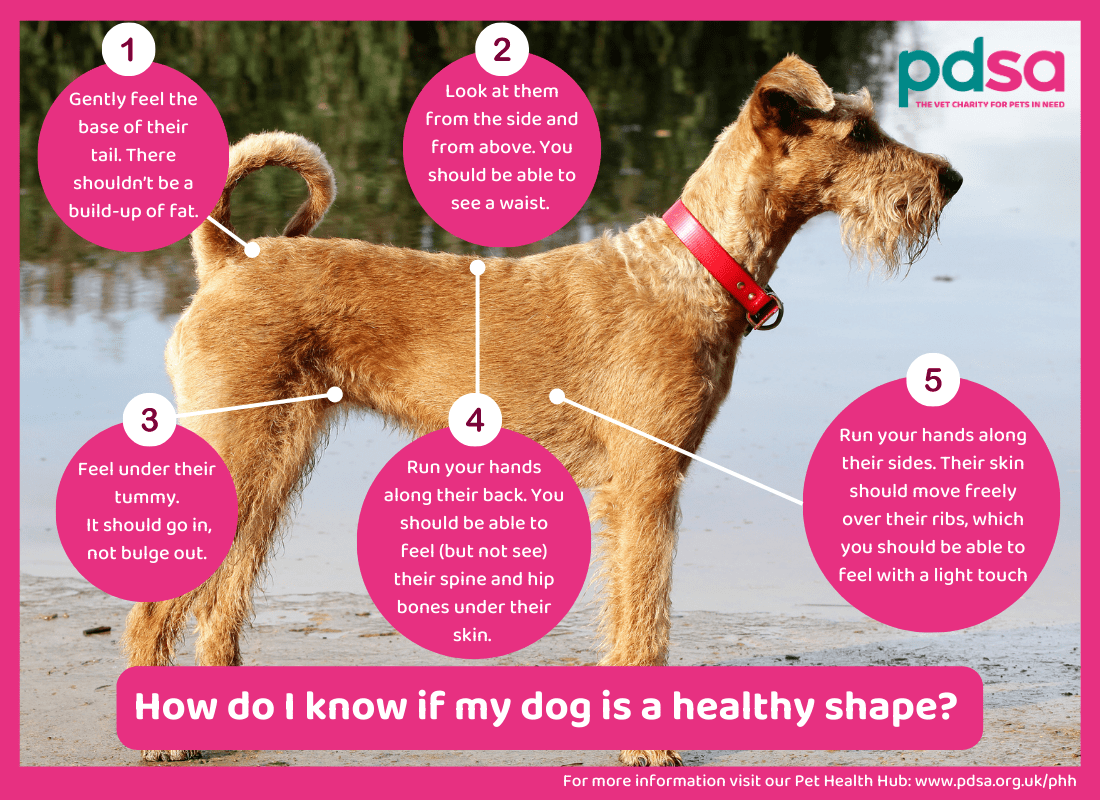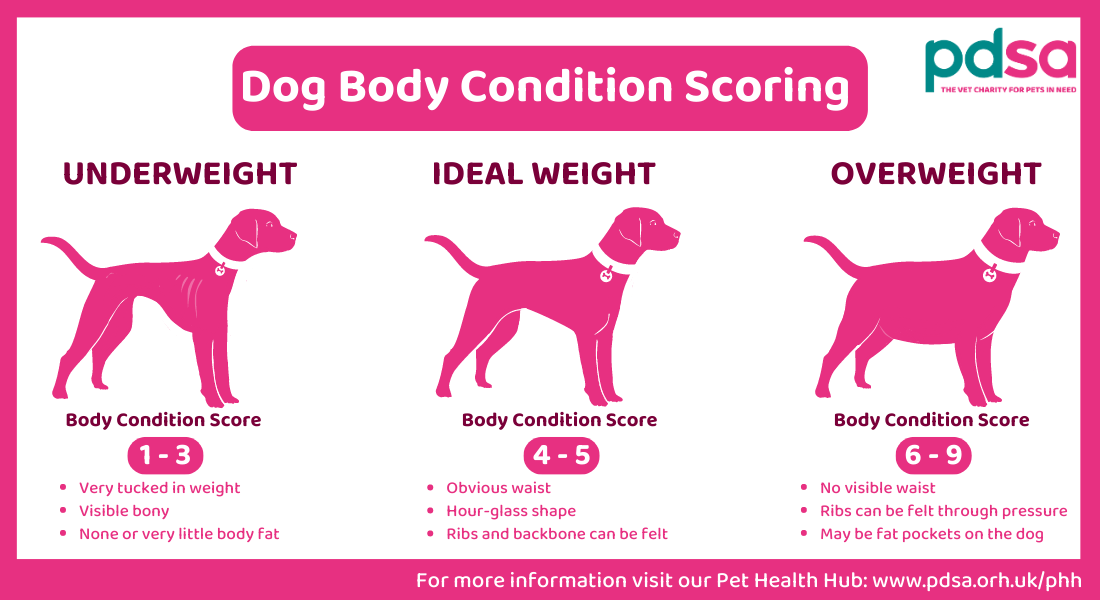Obesity in dogs
Overview
- Veterinary professionals estimate that nearly half of dogs in the UK are overweight.
- Being overweight is linked to several health problems and a reduced lifespan.
- It’s important to know what your dog’s ideal shape is and recognise when it changes.
- You can help maintain your dog’s ideal weight by giving them an appropriate diet and the right amount of exercise.
- For more advice on managing your dog’s weight, check out our ’Weigh Up’ pages or contact your vet.

How to body condition score your dog:
- Gently feel the base of your dog’s tail. There shouldn’t be a build-up of fat.
- Look at your dog from the side and from above. You should be able to see a waist.
- Feel under your dog’s tummy. It should go in, not bulge out.
- Run your hands along your dog’s back. You should be able to feel the spine and hip bones under the skin without being able to see them.
- Run your hands along your dog’s sides. The skin should move freely over the ribs, which you should be able to feel with a light touch.

 Video found at youtu.be/jHen85mkmRM
Video found at youtu.be/jHen85mkmRM
Why is my dog overweight?
Reasons your dog might be overweight include:
Diet and exercise – Your dog might be eating too much food or too many treats. They might also not be getting enough exercise. This is the most common reason for weight gain in dogs.
Medical reasons – Some medical conditions can cause weight gain in dogs. Examples include hypothyroidism and Cushing’s disease. If your dog has one of these conditions it is likely that they have other symptoms such as coat changes, low energy and increased thirst. Contact your vet for an appointment if you are concerned that your dog has a medical condition. However, these conditions are a much rarer cause of weight gain than an exercise and diet imbalance.
Medications – Certain medications, such as steroids, can lead to weight gain, particularly if they affect your pet’s appetite.
Health risks
Obesity in dogs is associated with many health issues, including:
- Arthritis
- Diabetes
- Cushing's disease
- Urinary incontinence (leaking urine)
- Back problems such as a slipped disk
- Cruciate ligament problems
- Breathing problems such as windpipe collapse and laryngeal collapse
- Breathing problems in flat faced breeds (BOAS)
- Certain types of cancer
- Heatstroke
- Injury
- A reduced lifespan
- Problems under an anaesthetic
How to help your dog lose weight
Weight loss plans should be individual to your dog, so it is best to speak to your vet practice for help if you would like your dog to lose weight. Plans will generally consist of changing their diet and making sure they are getting enough exercise.
Diet – The best option for many dogs will be a special weight reduction food which has the correct levels of fat, protein, and nutrients to support weight loss whilst helping your dog to not get too hungry. You should measure the amount of food carefully. Your vet or vet nurse can help you work out how much you should be giving to your dog. You should also restrict the amount of treats you give your dog. Read our advice on what to feed your dog and visit our Weigh Up page for more information.
Exercise – Alongside a change in diet, you should make sure that your dog is getting enough exercise. The amount of exercise your dog needs depends on their age, breed, and health. Read our advice on how much exercise your dog needs and visit our Weigh Up page for more information.
Monitoring – Weight loss in dogs is more successful when you have regular weigh-ins. Many vet practices offer weight clinics and have scales in their waiting room that you can use without an appointment. You should continue monitoring your dog’s weight regularly, even after they get to their ideal weight as this will help to keep them at their ideal size. Check out our video on how to weigh your dog at home.
Choosing a dog that fits your lifestyle
If you choose a dog that doesn’t fit in with your lifestyle, they are at risk of weight and behavioural problems. It’s important to find a dog that suits you and your family. For example, if you’re an active person, a dog that needs lots of exercise will be fine. If you are less active, and would struggle to give them the exercise they need, a dog that requires less exercise would suit you better. Check out our ‘Getting a dog’ advice for more information about choosing the right dog for you.
Cost
An overweight dog is more likely to develop health problems than a dog in good shape, so will be likely to need more veterinary care.
Consider insuring your dog as soon as you get them, before any signs of illness start. This will ensure you have all the support you need to care for them throughout their life.
Are neutered dogs more likely to gain weight?
Neutering doesn’t cause weight gain, but does cause hormonal changes that may increase your dog’s appetite and slow down their metabolism (how their body turns food into energy). This means they are likely to need fewer calories once they are neutered, so will need a change to their diet, such as food specifically for neutered dogs.
Are Labradors more likely to gain weight?
There are some breeds of dogs that appear to be more likely to be overweight, including Labradors, Golden Retrievers, Pugs, Cocker Spaniels and Cavalier King Charles Spaniels. It is likely that this is partly down to their genetics, but an appropriate diet and exercise for these breeds will still keep them at their ideal weight.
Published: August 2023
Did you find this page useful?
Tell us more
Please note, our vets and nurses are unable to respond to questions via this form. If you are concerned about your pet’s health, please contact your vet directly.
Thank you for your feedback
Want to hear more about PDSA and get pet care tips from our vet experts?
Sign up to our e-newsletter
Written by vets and vet nurses. This advice is for UK pets only. Illustrations by Samantha Elmhurst.

